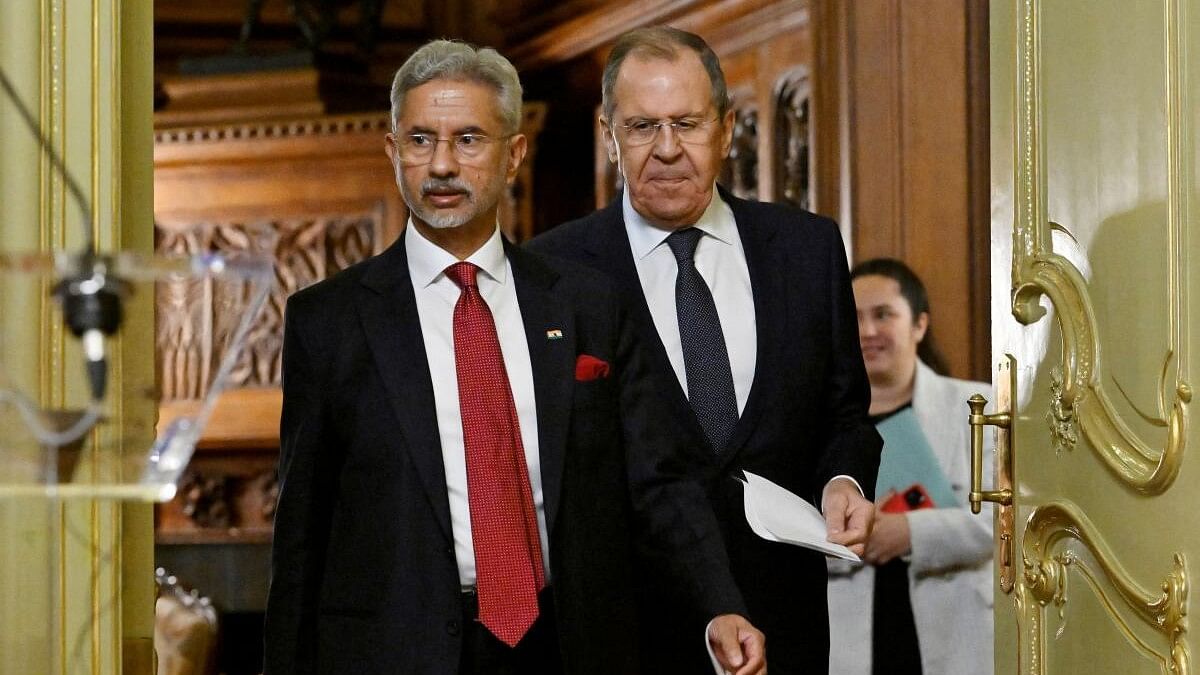
Jaishankar (left) and Lavrov (right).
Credit: Reuters Photo
New Delhi: External Affairs Minister S Jaishankar on Tuesday subtly hit out at the United States and the rest of the West for frowning upon India’s relations with Russia as well as for trying to dictate what India, being a democracy, should or should not do.
Jaishankar, however, played down United States President Joe Biden’s decision to turn down the invitation from New Delhi to attend the 75th Republic Day ceremony of India on January 26.
“We have always maintained that the Russia relationship is a very important one. I said in public even before my meeting with President (Vladimir) Putin that we value this relationship. It is a relationship that served India well,” the external affairs minister said in an interview with Asia News International (ANI) ahead of the launch of his latest book Why Bharat Matters.
Jaishankar recently visited Moscow and had meetings with the Russian Foreign Minister Sergey Lavrov and Deputy Prime Minister Denis Manturov. He also called on Russian President Vladimir Putin.
His visit to Moscow appeared to be intended to send out a message to Washington DC in the wake of the Biden Administration’s allegation about the role of an official of the Government of India in an alleged plot to kill Khalistani Sikh extremist Gurpatwant Singh Pannun in New York.
India earlier drew flak from the US and the rest of the West for not joining the clamour against Russia after the former Soviet Union nation launched its “special military operations” in Ukraine.
“I am looking at it from an Indian perspective... A country which has maximum friends and minimum adversaries is obviously one with smart diplomacy. Why would a country restrict its friends?... Why would it choose to unless the interest compelled it to do that? I am focusing on how to expand my relationships,” Jaishankar told the ANI.
New Delhi has been defying the sanctions imposed on Russia by the United States and the European Union and continuing India’s trade and economic engagement with the former Soviet Union nation.
“It is the mind games that others play that as a democracy you should do this and that. Please look in the mirror and tell me how you were behaving as a democracy...Every country has its values and interests, and it finds its balance…” said the external affairs minister.
The Biden Administration has been subtly conveying to the Modi Government in New Delhi its concerns over the perception in the US about the backsliding of democracy in India. The US State Department’s annual reports on religious freedom have been referring to the alleged incidents of atrocities and violence against minority communities in India. Biden’s Secretary of State Antony Blinken had in 2021 said that the US was “monitoring some recent concerning developments in India, including a rise in human rights abuses by some government, police, and prison officials”. He had followed it up on June 2, 2021, stating that India, the world’s largest democracy and home to a great diversity of faiths, had seen rising attacks on people and places of worship.
Modi’s spectacular state visit to Washington DC and his meetings with Biden on June 22 last yar had come under a bit of a shadow as 75 Democrat members of the American Congress wrote to the US president requesting him to convey concerns over reports of growing religious intolerance, shrinking of political space, curbs on freedom of the press and erosion of human rights in India. At least six US lawmakers had also boycotted the prime minister’s address to a joint sitting of the US Congress – alleging repression of religious minorities during his tenure at the top office in New Delhi. Even as Biden hosted Modi at the White House in Washington DC, former US President Barack Obama told CNN that if the rights of the minority Muslims in India were not protected, the country might someday start to pull apart. He had even suggested that the issue of protection of minority Muslims in Hindu-majority India was worth mentioning if the president of the US had a meeting with the prime minister of India.
Though Modi’s landmark visit to White House and his meeting with Biden added new momentum to the India-US relations, it again came under shadow after the US accused an official of the Government of India in the plot to assassinate Pannun.
